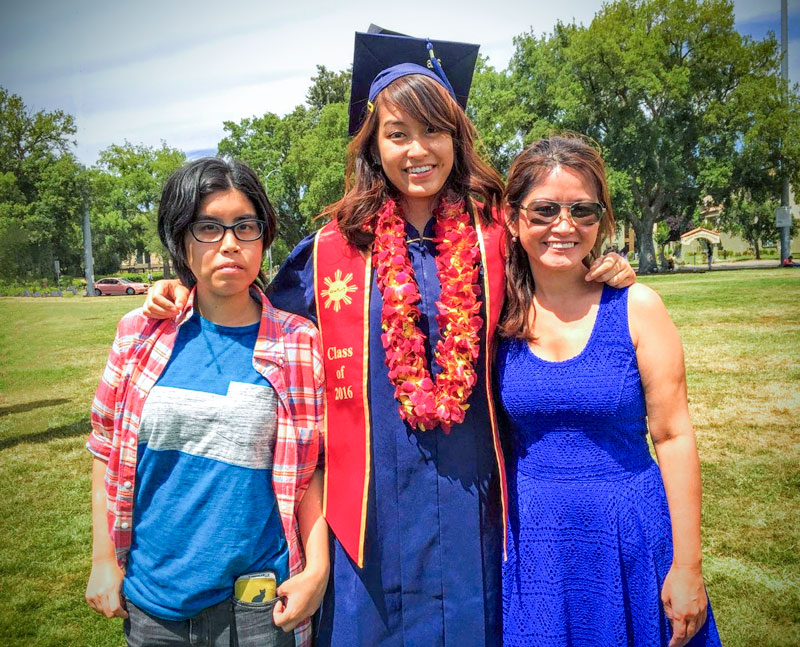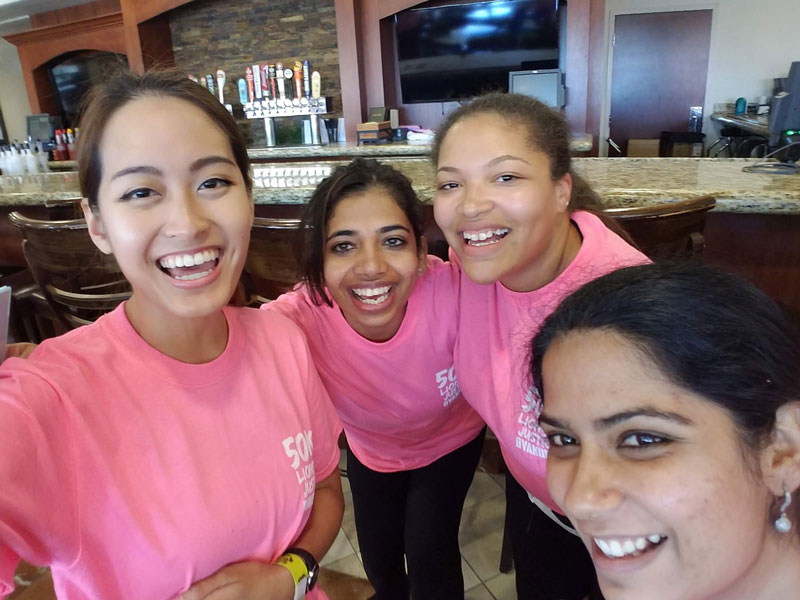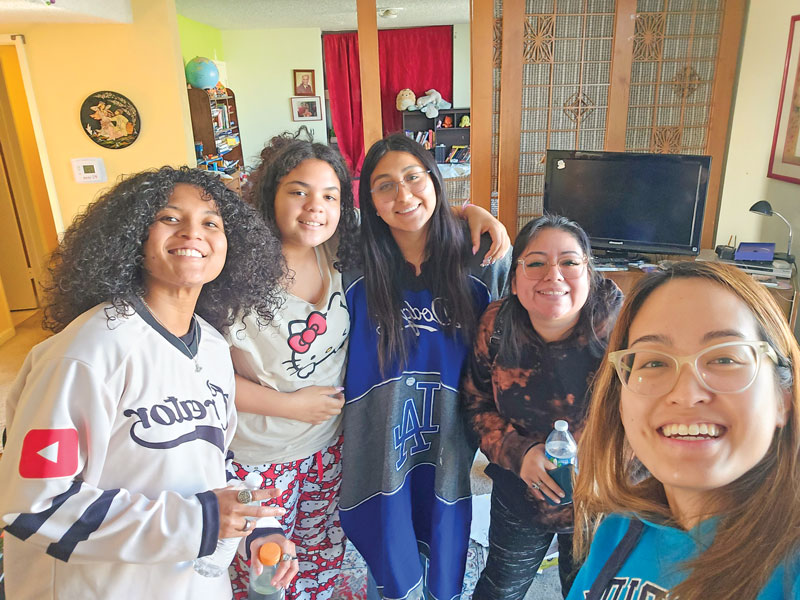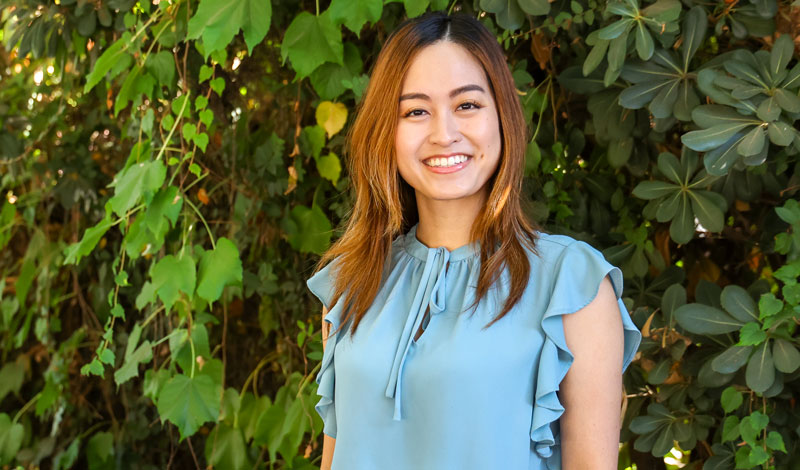Living Buddhism: Daisy, thank you so much for taking the time to talk. We understand that today, you’re highly valued at work. But this wasn’t always the case. In fact, the opposite was true.
Daisy Prom: Thank you. It’s true—my employers’ observations were always the same: “You don’t look like you want to be here.” And it was true—they saw what they thought they saw. For someone entering the field of health care, who felt powerfully driven from childhood to care for the underserved, abused and forgotten, I could not seem to convince anyone—myself included—that I actually liked people. In fact, the more there were, the more vigilant and exhausted I became—scanning for threats and tracking them down. Crowds, of course, were the worst.
And yet, for the sake of a person in need, I’d dive into any crowd to protect them.
It’s the reason you came to your first Buddhist meeting, isn’t it?
Daisy: Yes, my sibling, Addison, was receiving the Gohonzon—some mandala, I gathered, that Addison would be taking home as an important step on their journey in faith. I went to protect them from whatever it was they were getting into. But when I arrived, I found a diverse community of warm, unpretentious people familiar with one another’s lives. A young woman shared her experience of using faith to transform the resentment she’d felt toward her father. That inner transformation rippled out, eventually turning family strife into harmony. Featuring neither saints nor heroes, her story was of a young person who’d felt broken, used faith to get in touch with her heart and decided, based on the courage she found there, that she would be the one to heal. And I found myself fighting back tears—baffled and even annoyed to be disarmed in a setting like this—this crowd of total strangers.
Afterward, I turned the meeting over in my mind, scanning my memory for some overlooked threat. I couldn’t find one. In secret, embarrassed that I was willing to try, I started chanting a little each day. Slowly, reluctantly, I began coming out to local SGI activities.

How were these?
Daisy: Uncomfortable. In particular, I couldn’t stand the praise.
You didn’t like praise?
Daisy: I wasn’t used to it, I didn’t believe in it and, most importantly, I didn’t—or couldn’t—hear it.
“You were such a wonderful emcee!” for instance, was instantly rewritten by my inner critic into backhanded surprise: “You Daisy, of all people, managed to do something worthwhile!?” Authentic praise was simply, at that point in my life, the opposite of what I’d known—in my family and in the working world.
Things really got tough when I began supporting alongside the Byakuren Group, the behind-the-scenes training group for the young women’s division, where I received not only praise but also constructive feedback.
How’d that pan out?
Daisy: Good or bad, depending on the day. But several times, I snapped or rolled my eyes at the Byakuren in charge. The members, too, I’m sure, heard now and again the bite in my voice. Instead of paying me back in kind, my young women’s leader came and visited me, chanted with me and studied Ikeda Sensei’s guidance on the spirit of supporting others. This too, was uncomfortable—it was such a different response to my negativity than I’d received elsewhere.
Slowly, very slowly, I managed to relax into a different kind of listening, to trust in what Sensei and Nichiren Daishonin had written and believe that it was intended for me as much as anyone. Words of the Daishonin’s that my sisters in faith and I engraved in our lives were:
Arouse deep faith and diligently polish your mirror day and night. How should you polish it? Only by chanting Nam-myoho-renge-kyo. (“On Attaining Buddhahood in This Lifetime,” The Writings of Nichiren Daishonin, vol. 1, p. 4)
As I deepened my understanding of behind-the-scenes activities and directed my energy toward serving the members, my defenses, geared toward protecting myself, began to thaw.

How’d you carry this into daily life?
Daisy: Honestly? I’m sorry to say that I didn’t. It took me almost a year to realize this—that the Daisy I managed to bring forth at the local Buddhist center was left there when I went home. At home or at work, I was again my anxious, threatened self. A turning point came in 2020, in the early days of the COVID-19 pandemic.
By then you’d taken on chapter leadership, is that right?
Daisy: That’s right. But I wasn’t reaching out to any young women in my area. I had no idea what I was doing, really, and was sure they’d see this the moment I opened my mouth. But one day, I got a text in a loop from a few of the women in the area, updating one another on something unfolding in the neighborhood. The mother of a certain young woman had contracted COVID, and the daughter, struggling for weeks with anxiety and depression, was too anxious to leave her house for groceries. The women acted swiftly, checking in. As all this happened, I was overcome with shame—if anyone ought to have checked on her, it was me, but I’d been too stuck in my own head. After this, I began reaching out, then meeting regularly. If she was struggling, I’d ask if we could read something that had made me feel better, and we would—something from The Writings of Nichiren Daishonin or Sensei. I began chanting for her happiness ahead of our visits, for her to overcome specific challenges and achieve specific goals. Without realizing it, I found I was able to be for her the person I was at the center—positive and warm. In time, she responded in kind, brightening up and getting more involved.
From here, I began to carry my Buddhahood into the fiercest arena of my life—my work as a nurse practioner. I began asking myself, in the most difficult situations: What would Sensei do? As usual, I was the last person to recognize the changes taking place in me. Within the year, I was hired onto a new team, for a huge raise, into the highly competitive role of an inpatient psychiatric nurse. After the hire, they told me that they knew, upon interviewing me, that of the 12 highly qualified applicants, I was the one they would be hiring onto the team. Later on, these same colleagues would nominate me for the prestigious DAISY Award, almost unheard of for an inpatient psychiatric nurse, whose patients are often admitted in crisis, for short, intensive stays. I was stunned to hear my co-worker say that she’d begun to ask herself in difficult situations: What would Daisy do?
It was beginning to dawn on me that I might be worthy of calling myself a bodhisattva. I found myself more able to listen with the ears of the Buddha, to hear praise and believe the person who’d given it. I even allowed myself to be impressed by certain, previously unimaginable improvements—the end of my recurring nightmares, for instance, or maintaining calm when a situation was beyond my control.
And then, all this inner work, all this progress, collapsed like Jenga blocks in the winter of 2020 when my boyfriend, on the eve of his 30th birthday, was diagnosed with an aggressive form of cancer. Immediately he began chemo and was reduced to a shell of the person I loved, hardly able to move or speak. There seemed to be nothing I could do to help him. And this helplessness sent me spiraling.
Chanting through tears at the foot of his bed, I began to realize that I had to find a way to take care of myself to have any chance of taking care of him. This prayer for others was what gave rise, eventually, to the awareness that I needed support myself. Somewhere in the winter of 2020, for the first time in my life, I sought professional help and learned that I had complex PTSD, something I initially rejected. “You’re thinking of my parents,” I told my therapist. “They’re the ones who fled a genocide. Not me.”
My parents met in the United States, years after fleeing Cambodia as children. Both had watched countless loved ones die before their eyes, sometimes in their arms, most often from starvation and dysentery. “Worse than bullets,” my mother always insisted. “The most horrible way to die.” Both carried the guilt of survival, as though it were the dead, and not they themselves, who’d been abandoned and left behind.
They’d been children then, too small to protect the people they loved. For my father, in particular, that pain had become a rage that could tear through the house like a fire. Often, I’d watch, too small to be of help to anyone.
It was always an argument between my therapist and me—my therapist prodding, me denying. But between our conversations, I was having other ones—with friends in faith and with myself in front of the Gohonzon. Between these, there was something I began to understand—that the negative voice that could come tearing through my mind, was not mine.

Whose then?
Daisy: I remember a talk I had with a women’s leader in 2021, soon after my boyfriend’s cancer was deemed in remission. I mentioned the negative inner voice that I’d thought I’d begun to overcome but that had attacked me so viciously throughout my boyfriend’s recovery.
She listened and then told me that she’d had a similar voice once. It was only after several years of Buddhist practice that she identified that voice as her father’s.
“Without knowing it, I’d made his words my Gohonzon,” she said, “meaning, I’d accepted them as absolute and placed them at the center of my life. That brought me so much suffering. What I had to do was ask myself, whenever I heard that negative talk in my head: Whose words are these that I’m hearing? Are they true? Or are these the echoes of someone else’s shame, someone else’s wounds?”
Immediately, I argued (as usual), “But it’s not a choice—it’s like, baked into my DNA.”
“It’s a choice,” she said firmly. “It might not feel that way right now, but when you hear this voice again, you have a choice—you can ask yourself: Is this what Sensei would say of me? Then crack open something—anything, really—that Sensei has written and find out.”
I began to do this and then chant, internalizing what I’d read as something addressed to me directly. Slowly, the abuse that I’d assumed was “baked into my DNA” began to unfuse from the depths of my life, and I began to engrave Sensei’s praise in its place.
How was work?
Daisy: Exhausting. I was starting to admit to myself that I might be running myself into the ground. Now and again, a “Code Gray” sounded over the intercom, meaning that a patient had become violent. Immediately, I’d run to the scene, but not always in time to protect them. Personal threats and assaults were one thing, but attacks on co-workers I sometimes couldn’t protect—these were truly taking a toll. After one such attack in the spring of last year, I took a long walk with my women’s division co-leader, who asked me, simply, if I was truly happy at work. To both our surprise, I burst into tears.
You hadn’t realized just how much stress you were under.
Daisy: No, I hadn’t. And I don’t know how long it would’ve taken for me to realize on my own. After this, I began for the first time to include my own happiness at the forefront of my prayers. Many emotions arose—in particular guilt at the prospect of leaving my current colleagues and patients behind. But the more I chanted about this, the more strongly I felt that to enter a new chapter of my career, in a setting that did not retrigger my traumas, was not failure. If I was to help others become happy, I myself had to become happy. And I deserved this, to feel safe and protected at work.
Last December, I landed a job that answered my prayers to a T, with another huge pay increase and a supportive team. It took me another half a year to begin to fully internalize that I deserve this level of appreciation, safety and pay.
That is wonderful. Daisy, one last thing—whatever happened to that young woman you mentioned before, the one too anxious to leave home for groceries?
Daisy: Ah, yes. Total turnaround. I remember clearly a discussion meeting she emceed at the end of 2022, where a woman in her 90s was attending for the first or second time. Apparently, this elderly woman had been suffering for years. “I’m over it!” she proclaimed, by which she meant life. That’s when that young woman piped in and brought up how she’d been depressed once too.
“I was working at McDonald’s,” she said, “and I remember staring at the fry oil and wanting to throw myself in. But then Daisy started visiting me and I started chanting and feeling better. If you chant Nam-myoho-renge-kyo and keep at it, you’ll feel better too!”
I was stunned when I heard this. I hadn’t realized that I’d had that kind of impact. In any case, that woman, she since received the Gohonzon, having begun to feel positive inner change.
That’s so great. What would you like our readers to walk away with?
Daisy: Being happy is a choice. You might think there’s no hope of transforming yourself or your situation. But when that inner negativity arises, you can let it run its course or you can fight it, chanting powerful daimoku until you believe in the depths of your life that you deserve happiness and are capable of creating it.
You are reading {{ meterCount }} of {{ meterMax }} free premium articles

